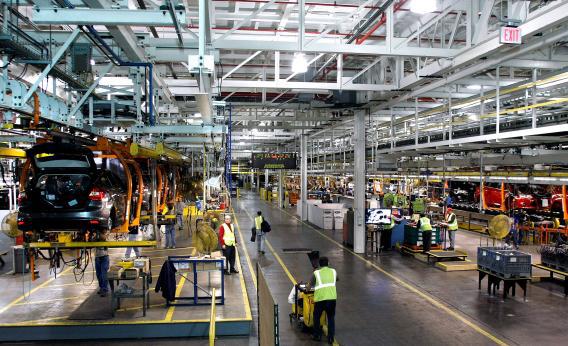I try to make it a point not to disagree with my colleague Matt Yglesias. In general, we see eye-to-eye—as in this observation from Saturday about the negative effect that austerity, modest though it has been compared with Europe’s, has had on the U.S. economic recovery. I’ve also seen him work on those who issue a challenge—he’s relentless.
That said, we part ways on the prospects for U.S. manufacturing. Matt regards recently progress on manufacturing to be largely the result of passing dynamics—i.e., a “success” only because of zero effects. As he said recently, “Obama’s foolish obsession with manufacturing jobs will make us poorer.”
I don’t think that is so. I also believe the evidence that Obama and pro-industrial policy wonks cite to show that there is a genuine rebound has now moved beyond the anecdotal stage (though I agree there’s plenty of politics being played with the ‘reshoring” concept). Matt, I think, would argue jobs moving back to the US will not, over the long term, benefit society since American labor had to stoop to Chinese levels to recapture these positions.
I tend to see it the other way around—that the inevitable result of China’s long but steady slog toward upper middle income status is a rising demand among its workers for safety, environmental standards, days off, holidays, not to mention higher pay. All that is good for business in America.
Still, most economists—even those inclined to sympathize with the Obama administration’s economic policies—scoffed in 2010 when, in his State of the Union address, the president vowed to double U.S. exports in five years—creating 2 million jobs in the process.
It’s not that this wasn’t possible in the eyes of economists. It just wasn’t likely, they thought, that the global conditions and political climate in the United States would allow it. The “zero effect”—the distorting phenomenon of measuring growth starting at an unnaturally low point—kept a damper on enthusiasm even as export figures soared in 2010-11.
Many experts assumed that the favorable trends supporting that growth had little to do with long-term shifts. Instead, most felt the numbers reflected a coincidental confluence of events: sky-high oil prices that drove the costs of shipping upwards, a mega-recession that undermined American labor’s negotiating leverage, Federal Reserve “quantitative easing” that kept the dollar cheap and pumped up US exports, and freak events like the euro zone meltdown and the Japanese earthquake/tsunami that took major players off the economic chessboard.
But the data has started to cause reassessments. Monthly net exports have grown from $140 billion to $180 billion since the start of 2010.
Indeed, energy exports (mostly refined gasoline, jet fuel, and natural gas) have suddenly grown into the single most valuable product sent abroad by American manufacturers, the first time in 60 years the US has been a net exporter of any of these items.
For more on this, see my column today on GlobalPost.
